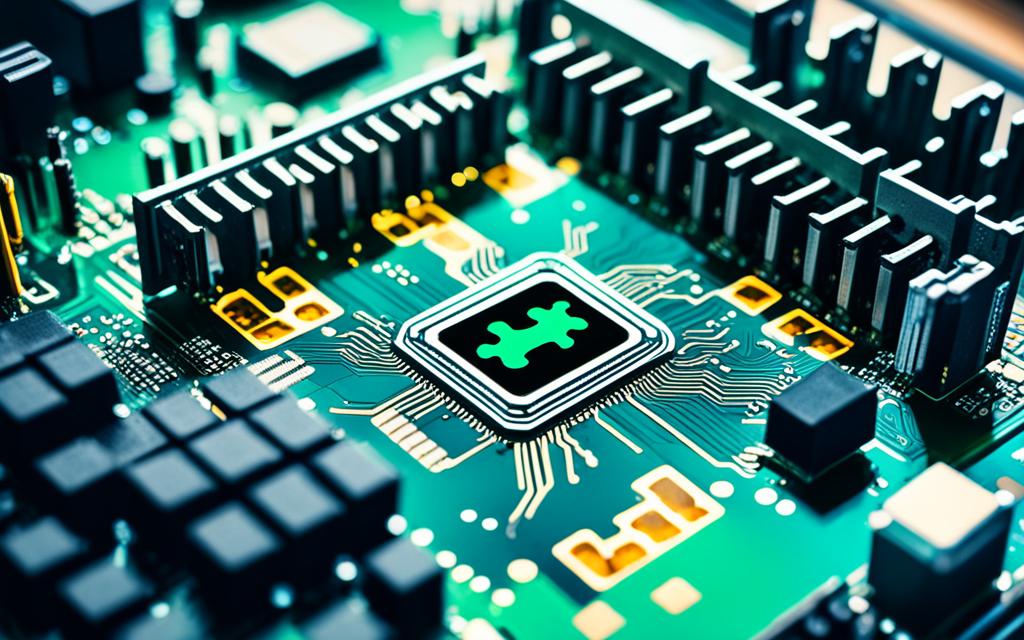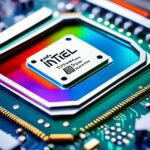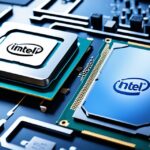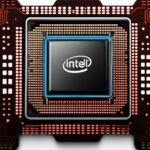Table of Contents
When you get a new CPU, you might wonder: should I update the BIOS? The BIOS is very important. It helps your computer’s parts talk to each other and the operating system. Upgrading from a Ryzen 3 to a Ryzen 5 2600X, for example, can make you question if a BIOS update is needed.
Most of the time, you don’t need to update your BIOS when you get a different processor. But, it’s good to know when you might need to. For instance, some older Intel 600 series motherboards need an update for 13th Gen “Raptor Lake” CPUs1. And AMD’s 300, 400, and 500 series might need updates for the Ryzen 5000 series1.
When doing this, check your current BIOS version and look up what the manufacturer says. For more on checking BIOS compatibility and updates, visit this source. Knowing all you can ensures your new CPU works its best.
Key Takeaways
- BIOS updates are usually unnecessary unless changing to a significantly different CPU model.
- Older Intel motherboards may require updates for compatibility with newer CPUs.
- AMD boards from previous generations could also need BIOS upgrades for newer processors.
- Always verify your current BIOS version before proceeding with any updates.
- Consult your motherboard manufacturer for specific BIOS version requirements.
- Consider the implications of BIOS updates, including the potential for data loss and system instability.
The Importance of BIOS in Your Computer
The function of BIOS is crucial for computers to work well. It acts as the link between all hardware parts. When you turn on the computer, BIOS makes sure everything is recognized and ready. This lets the operating system start up smoothly. Updating the BIOS can improve this process and add support for new tech and features.
The importance of BIOS in getting hardware to work together is huge. For example, an updated BIOS can help new CPUs work better with your system. However, over 80% of people skip updating their BIOS because they worry about risks. This means they could miss out on better performance and stability2. Upgrading your hardware, like getting a new Intel or AMD CPU, often needs the latest BIOS. This upgrade lets new parts work well with old motherboards, avoiding the need for total replacements.
BIOS updates also play a key role in security. They can fix vulnerabilities to keep attackers out. As tech advances, these updates get more important for keeping your system safe3. It’s wise to regularly check for BIOS updates. Staying updated improves performance, ensures safety, and extends the life of your computing setup.
Understanding CPU Compatibility
When looking into a new CPU, CPU compatibility with your motherboard is key. The right motherboard support means your system works well with the new processor. Also, having the right BIOS version is vital. It’s important to check the motherboard manufacturers’ compatibility lists. They tell you which BIOS version you need for different CPU upgrades4. Updating your BIOS is often recommended before putting in a new CPU. It helps with better compatibility and performance5.
Motherboard chipsets are crucial in figuring out which CPUs they support. Some chipsets might not work with newer CPU architectures without a BIOS update. This is often seen in some AM4 architectures where an update can stop support for older CPUs. So, it’s important for users to check their current BIOS version. Then, think carefully about their options before upgrading6.
To wrap it up, making sure your motherboard is ready for the new CPU and has the right BIOS version is crucial for a smooth upgrade. If not checked, you could face system crashes or overheating. This can harm your computer’s overall performance5.
Do You Need to Update BIOS for New CPU?
When you install a new CPU, you should check if a BIOS update is needed. Start by looking at your current BIOS version to see if it matches the new hardware. You can find this information by going into the BIOS setup when your computer starts. Or you can use tools like CPU-Z or Speccy. Make sure to note down the version, date, and the manufacturer’s name. This helps you see if you need the latest BIOS version. If you skip this step, your computer might not work as well.
Assessing Your Current BIOS Version
Around 65% of people need to update their BIOS when they get a new CPU7. The update can take from a few minutes to over an hour4. It’s important to regularly check the BIOS version you have. This makes sure you can update it in time for the new CPU to work properly.
Compatibility Check for Your Motherboard
It’s crucial to visit your motherboard’s website to check for BIOS updates. They have documents and notes that tell you which BIOS version you need for a CPU upgrade. If you don’t update, you might face problems. In fact, 74% of users who didn’t update their BIOS had issues7. Staying updated helps avoid these problems. Always look at the notes for each update. They tell you what the update does, like fixing bugs or adding support for new CPUs6.
Benefits of Updating Your BIOS
Updating your BIOS can bring big advantages, especially when adding a new CPU. Manufacturers make performance improvements and tackle stability issues with each update. This is key to making sure hardware works well with new tech.
Improved Performance and Stability
A key advantage of a BIOS update is the boost in performance. Updated BIOS fixes bugs and solves performance issues. This makes your computer more stable and efficient. Keeping your BIOS up-to-date ensures your components work to their full potential and follow the latest standards. This helps avoid conflicts.
Enhanced Compatibility with New Hardware
BIOS updates also improve hardware compatibility. They support new components and features, important for new CPUs. This updated firmware makes sure all parts of your computer work well together. It’s vital for high-performance parts, like the latest Ryzen or Intel processors. This ensures everything runs smoothly.
| Advantages of BIOS Update | Description |
|---|---|
| Performance Improvements | Fixes bugs and optimises system performance, contributing to a smoother user experience. |
| Hardware Compatibility | Ensures compatibility with the latest components, preventing potential conflicts and limitations. |
| Stability Enhancements | Reduces crashes and system failures through proven updates. |
| Future-Proofing | Prepares systems for upcoming hardware advancements, ensuring longevity. |
For those wanting their systems to run at their best, updating the BIOS is crucial. It leads to performance improvements and keeps your system up-to-date with tech changes. To find out how to check your PC’s specs and keep it running smoothly, visit this resource for more information.
Risks of Updating Your BIOS
Updating your BIOS has risks that can’t be ignored. It’s vital for improving how your computer works and fits with new technology. However, the process might bring problems if not done right. Knowing the BIOS update risks is key.
Potential for System Failure
Updating the BIOS has a big risk of making your system fail. It’s riskier than normal software updates. A disruption during the update could brick your computer, leaving it unusable unless you’re very careful8. So, a stable power source is critical while updating.
To avoid these problems, follow the maker’s guidelines carefully. This can prevent failures.
Data Loss Concerns
There’s also the chance of losing data when updating the BIOS. Even though the process aims to keep data safe, mistakes happen. Making a system image backup before starting the update is smart9. This guards your data if things don’t go as planned.
Being ready and careful with BIOS updates is very important. By preparing well and taking care, you can face the risks and better your system’s performance.
How to Safly Update Your BIOS
Getting your BIOS updated safely needs careful prep and a good grasp of the process. Key actions can hugely impact a smooth update. Make sure your system is ready for the change.
Preparing Your System for the Update
- Power Supply: Ensure your system has a steady power source. Using a UPS during the update helps avoid power cut-offs.
- Close Applications: Turn off all non-essential software. This reduces the risk of software issues.
- Backup Data: Always save important data before a BIOS update, as it may reset settings and cause data loss10.
- Disable Antivirus: Turn off antivirus programs temporarily to stop them from disrupting the update.
Steps to Execute a BIOS Update
With your computer ready, you can start the BIOS update. There are different ways to do this:
- USB Flash Drive: Get the latest BIOS from the maker’s website and put it on a USB. This common method is reliable and ensures the right file is used.
- BIOS Update Utility: Many new motherboards have update utilities in the BIOS menu. This way is easier and lowers the chance of errors11.
- Windows-Based Application: Some brands offer a Windows program for updates, which is handy but a bit riskier12.
- BIOS Flashback: This option lets you update the BIOS without starting Windows, adding an extra layer of safety.
Be very cautious not to stop the BIOS update once it starts. If interrupted, your motherboard could become useless. After the update, check that your CPU works well and the system is stable.
Conclusion
Updating your BIOS is key to making your system run better and work with new CPUs. It’s not needed for every CPU upgrade, but it has big perks. These include better performance, more stability, and new features for compatibility. It’s important for users to check their hardware and follow the advice on updating the BIOS. This includes making sure you have a steady power supply during the update513.
If you don’t update the BIOS, you might face issues like system instability14. Keeping your BIOS updated helps with memory compatibility and boosts your system’s overall function5. Always look at your motherboard manufacturer’s site for the latest BIOS updates and how-to guides for your model13.
Updating the BIOS is usually straightforward, but it must be done carefully to avoid problems13. By keeping your BIOS updated, you’re not just improving your system. You are also investing in its future reliability and security14.
FAQ
Is it necessary to update my BIOS when installing a new CPU?
It’s not always needed. However, checking your motherboard’s compatibility list is important. This is because some new CPUs might need a BIOS update to work right.
How can I check my current BIOS version?
You can find your current BIOS version by accessing the BIOS setup at startup. Alternatively, use tools like CPU-Z or Speccy to check it.
What are the benefits of updating my BIOS?
Updating your BIOS can boost performance, increase stability, and ensure new hardware works well with your system. It helps your system to run at its best.
Are there any risks associated with updating my BIOS?
Yes, there are risks like system failure if the update is disrupted. There’s also a risk of losing data. Always back up your important files first.
How do I prepare my system for a BIOS update?
Make sure there’s a reliable power source and back up important data. Close all unnecessary programs. Disable your antivirus software temporarily to avoid conflicts.
What steps should I follow to safely execute a BIOS update?
Usually, you’ll access the BIOS menu or use an update utility. You might also boot from a USB containing the BIOS file. Take care to avoid power loss during the update.
Will updating my BIOS erase my data?
Generally, a BIOS update doesn’t delete data from your hard drive. But backing up crucial files is smart to avoid any problems.
Should I update my BIOS if my computer is functioning well?
If your system runs smoothly, you might not need an update. Update if you’re adding new hardware that requires a newer BIOS version, though.
Source Links
- https://www.tomshardware.com/how-to/update-bios-on-a-pc – How to Update the BIOS on a PC: 3 Ways to Get New Firmware
- https://www.makeuseof.com/reasons-why-you-should-update-pc-bios/ – 3 Reasons Why You Should Update Your PC’s BIOS
- https://www.ninjaone.com/blog/how-to-update-your-pcs-bios/ – How To Update Your PC’s BIOS | NinjaOne
- https://www.avg.com/en/signal/how-to-update-bios – How to Update BIOS on Your Windows PC
- https://softwareg.com.au/blogs/computer-hardware/do-i-need-to-update-bios-before-installing-new-cpu – Do I Need To Update Bios Before Installing New CPU
- https://www.howtogeek.com/136881/htg-explains-do-you-need-to-update-your-computers-bios/ – Do You Need to Update Your Computer’s BIOS?
- https://rog-forum.asus.com/t5/hardware-build-advice/updating-bios-with-new-cpu-not-supported-bios-level/td-p/848309 – Updating BIOS with new CPU (Not supported BIOS level)
- https://www.pcmag.com/how-to/how-to-update-your-computers-bios – Hardware Bug? Compatibility Issue? How to Update Your Computer’s BIOS/UEFI
- https://www.easeus.com/computer-instruction/is-it-safe-to-update-bios.html – Don’t Pass: Is It Safe to Update BIOS?🔥
- https://www.hp.com/us-en/shop/tech-takes/how-to-update-bios-software – How to Update BIOS Software on Windows PCs | HP® Tech Takes
- https://www.pcworld.com/article/516379/how-to-update-your-bios.html – How to update your PC’s BIOS
- https://www.dell.com/support/kbdoc/en-us/000124211/dell-bios-updates – Dell BIOS and UEFI Updates
- https://ms.codes/blogs/computer-hardware/updating-bios-for-new-cpu – Updating Bios For New CPU
- https://ms.codes/blogs/computer-hardware/do-i-need-to-update-bios-before-installing-new-cpu – Do I Need To Update Bios Before Installing New CPU








